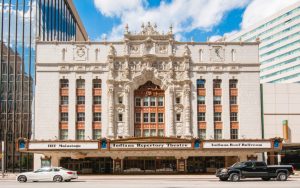
Suzanne Sweeney – Courtesy of Indiana Repertory Theatlre. Used with permission.
One of the last shows I saw before Governor Eric Holcomb’s stay-at-home order went into effect was Indiana Repertory Theatre‘s “Murder on the Orient Express” on opening night, March 3 and praised in a subsequent review. Following the performance, I remained for the traditional champagne toast and took advantage of the opportunity to meet and greet the cast members. Later, I went on stage to see the set and meet the artists and technical staff who created it. Soaking up the excitement and joyousness of the entire evening, I left feeling the great satisfaction that only comes from experiencing live theatre and interacting afterwards with the artists who create it. As a long time reviewer I have never taken my frequent attendance in a theatre or concert hall for granted, but could hardly have guessed what the future would hold.
After the state went into lockdown and non-essential businesses and activities were shut down, the IRT, like every other performing arts organization, was forced to cease operations. Since then, those who oversee the business side of these institutions have faced their own special set of challenges.
With that in mind, I reached out to Suzanne Sweeney, managing director and co-CEO of the Indiana Repertory Theatre. Sweeney, a 21-year veteran of the IRT, works alongside artistic director and co-CEO Janet Allen and oversees all of the administrative functions of the organization including marketing, fundraising, ticket office, house management, finance, human resources, information technology and building operations. Juggling all those kinds of responsibilities while navigating a pandemic requires a special set of skills, not to mention a special temperament. Those who know and admire Sweeney, as I do, all agree that she is the right person to be at the helm during a crisis that demands steady leadership of Indiana’s premiere professional theatre. Below are Sweeney’s responses to questions I sent her during a recent email exchange.
How did it feel to have to cancel the remainder of the season?
The word we have used over and over has been “devastating” and that truly sums it up. At the time, while no one was sick with COVID-19 (and we were most grateful for that) there were so many artists and administrators who had put so much effort into bringing our work to the stage and it was really difficult to have to tell them their run was going to be cut short or not open at all.
How has the pandemic impacted IRT?
We canceled two and a half plays, which translates into a third of our season. We still feel lucky about the timing because losing our holiday production of “A Christmas Carol” and potentially more of the season would have been worse. Our revenue has taken a significant hit, with a loss of over $1 million, or about 15 percent of our budget goals. We also canceled our in-person summer camps, but are relieved we have no other summer programming to consider.
How exactly is the organization planning for the future?
We have spent considerable time communicating with our ticket buyers and donors about ending the season early and simultaneously we have been planning for a wide range of scenarios. We are in constant communication with other local arts leaders and our peer theatres nationally. As we develop our plans for next season, we are first focused on the safety of our patrons, staff and artists. Second, we are hoping not to have to move forward in fits and starts. When we open the season, our hope will be we do not need to cancel performances.
There are a lot of logistical challenges to consider from the significant to the mundane. While social distancing may be possible in an audience, although at a greatly reduced capacity, how does it work for actors who need to interact and touch the same props? How do we manage restroom lines and social distancing in the lobby? What if someone needs to get up during a performance? How do they get past others in their row?
What response have you received from your donors and sponsors?
Our donors and sponsors have been universally supportive and have continually asked how they can help. We have begun hosting happy hours to stay in touch, and the concern of our individual donors, as well as their excitement for the IRT to be creating again are both very gratifying and energizing. And in the next few weeks, we will be announcing a wonderful piece of news about a major sponsor stepping up; so, stay tuned!
What has been the response of subscribers and IRT fans in general?
This is the thing that gives me the most hope. Many people donated their tickets back and even those who couldn’t were very understanding and looking forward to being back next season. They are the reason we do this work.
What has been the response of artists and technical staff employed by the IRT?
Our teams could not have been more professional and diligent about the many changes that occurred, especially in the first few weeks. They have remained devoted to the IRT and to their work and we are grateful to have colleagues who support and believe in our mission during this time.

Indiana Repertory Theatre – Courtesy of Indiana Repertory Theatre. Used with permission..
How has the pandemic impacted you personally?
It has taken me a while to get used to working from home, but I am getting into the swing. The challenge here is that the kitchen is only a few steps away! Also, I used to have to at least get up and walk to meetings, but I find now that I can sit at my table for hours, since I just move to a different device for meetings. And I miss being able to have a quick conversation with my team. Having every communication be a Zoom meeting, call or email really adds to the time it takes to accomplish everything.
I also went through stages of grief about the loss of our season and the steps we need to move backward after years of wonderful results. It felt like I was watching years of progress go up in smoke. As time has passed and we are learning more about what might be possible, I am energized by how we can move the IRT forward into a new era—an era where I truly believe we will not take the opportunity to see live performances for granted.
How are you spending your time?
I never have time in spring for landscaping and we have been working in the yard, digging up beds, setting up soaker hoses and planting. This felt really rewarding until Sunday, when I woke up with a horribly swollen face from cutting down poison ivy vines that we didn’t realize were poison ivy. Good lesson to learn, I guess, and the one time I’m grateful to be forced to stay at home!
I’m also fortunate that my boyfriend, Todd Wiencek, who lives in Illinois, is able to be here with us. And that my 16-year-old Jackson is old enough to do his online school work on his own! I’m grateful for this time for us to be together and our nightly cutthroat games of Settlers of Catan. My son is a junior in high school and will be off to college soon, so these weeks have been precious to me. My foxhound rescue dog, Gertie, is also with us.
What do you miss the most?
I had always thought I was on the introvert/extrovert line, tending to introvert – mostly because if I ever had a weekend with no plans, I was so excited to be at home. I’m learning that I miss the energy I get from being around other people. I miss interacting with our wonderful team of staff members every day. I miss learning about the art from the talented artists. I miss seeing live theatre at the IRT and other venues. We filmed the final performance of “Murder on the Orient Express” for a small audience of staff and invited guests and I cried when it was ending because I didn’t know when we would be able to sit in the OneAmerica Mainstage Theatre and watch a play again
What are you learning from this experience?
We’re each stronger than we realized, but we are all stronger together.
What is your hope for the “new normal”?
I hope we will remember how the arts got us through this period and why it’s important the arts are in our lives. I hope our community will be kinder and we don’t lose our focus on equity, diversity and inclusion. I hope we will take what was good from this period—slowing down our lives, experiencing the outdoors in different ways, spending time around a table playing games—and carry it with us into the future. None of us knows exactly what the “new normal” will look like. I am looking forward to us all devising it and experiencing it together.
What is your overall message to the public regarding IRT?
The IRT is a financially stable theatre and we will be here to serve our community when the pandemic is behind us. We may look a little different; we may be a little smaller, but we will be producing the great productions our audiences have come to expect. And I know the IRT team and our patrons will all be a little more grateful to be back sitting in a dark theatre together, ready to watch the magic of live theatre happen, because we have learned that it’s not a given.
For further information or if you would like to donate to the Indiana Repertory Theatre, go to irt.com.





